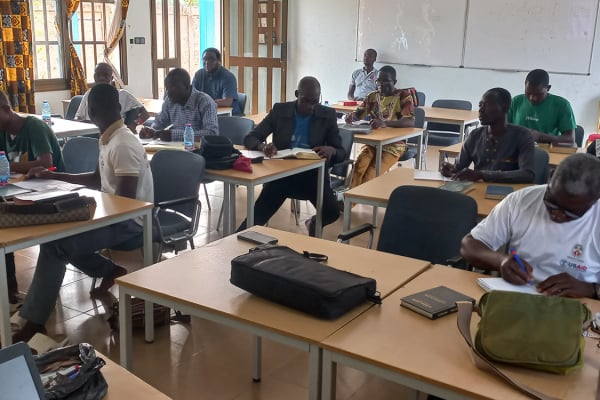
October 8, 2014
Love: An Invitation to Relationship
Read the series: Part 1 | Part 2 | Part 3 | Part 4
Disciple-making is all about relationships, relationships are all about love, and love is what marks us as Jesus’ disciples. In John 15:12-14, Jesus commands us to love. He parallels our obedience with our love (not just following do’s and don’ts), and warns us about cost: our very lives.
A Working Description
Love is given through those attitudes, words and actions that invite relationship — taking the initiative and moving toward the undeserving for their well-being.
Our example: God took the initiative, moved toward us, and invited us to relationship with Himself.
Initiative | Love drives someone to begin the pursuit. The obvious challenge comes when we view others as undeserving of love because of a real offense, a bothersome annoyance and/or the prospect of receiving nothing in return. In other words, when we are not treated as we desire to be.
Movement | Pursuit in love always involves moving relationally — opening our heart to another — and sometimes physically — picking up a telephone, walking across the street, or moving across a cultural divide.
Relationship | Love initiates and moves with the goal of relationship. Love is more than being nice, patient, or kind to someone who doesn’t deserve it; it is inviting another into relationship as God invited us.
A disciple of Jesus is marked by love, which is an invitation to relationship. So what does a disciple do? He invites people to relationship. With whom? With God and him/herself. With this definition, we see immediately that a disciple makes disciples. The nature of love requires it.
However, we are not always aware of this because the motives and desires of our heart are often hidden (James 4). We simply see the result: tensions and distance in our relationships (best case) or destruction of relationships (worst case).
Disciple-making is all about relationships, relationships are all about love, and love is what marks us as Jesus’ disciples. In John 15:12-14, Jesus commands us to love. He parallels our obedience with our love (not just following do’s and don’ts), and warns us about cost: our very lives.
A Working Description
Love is given through those attitudes, words and actions that invite relationship — taking the initiative and moving toward the undeserving for their well-being.Our example: God took the initiative, moved toward us, and invited us to relationship with Himself.
Initiative | Love drives someone to begin the pursuit. The obvious challenge comes when we view others as undeserving of love because of a real offense, a bothersome annoyance and/or the prospect of receiving nothing in return. In other words, when we are not treated as we desire to be.
Movement | Pursuit in love always involves moving relationally — opening our heart to another — and sometimes physically — picking up a telephone, walking across the street, or moving across a cultural divide.
Relationship | Love initiates and moves with the goal of relationship. Love is more than being nice, patient, or kind to someone who doesn’t deserve it; it is inviting another into relationship as God invited us.
A disciple of Jesus is marked by love, which is an invitation to relationship. So what does a disciple do? He invites people to relationship. With whom? With God and him/herself. With this definition, we see immediately that a disciple makes disciples. The nature of love requires it.
The Obstacle to Love: Self-Protection
Most of the issues we deal with in life are relational — the difficulty of getting along with people and loving them in truth. What keeps us from moving toward others in relationship? We live in a fallen world where sin and evil are around us and in us. By nature, we seek to protect ourselves from the harm that inevitably comes through circumstances and relationships. Our pride and innate commitment to ourselves aim to keep a safe distance in our relationships, violating God’s desire for us to love others as a reflection of His sacrificial love for us.However, we are not always aware of this because the motives and desires of our heart are often hidden (James 4). We simply see the result: tensions and distance in our relationships (best case) or destruction of relationships (worst case).
The Work of the Holy Spirit
As we walk in God’s Spirit, He wants to produce in us the growing desire and capacity to love others as Christ has loved us. And He does this by satisfying our fundamental desire for love and life with Someone who never fails, growing our assurance of His goodness and love which casts out our fear so that we are free to move toward another with integrity, tenderness and strength — as He moves toward us.More Articles
TOGO — A man prayed for 38 years for the church to come to his village.
August 6, 2025
CANADA — A routine maintenance visit leads to a search for eternal truth.
September 3, 2025
CENTRAL ASIA — A chemistry class assignment sparks questions of faith for Maya in Asia.
October 1, 2025
FRANCE — Lucie’s isolated faith turns to bold witness in her new community.
November 5, 2025
MEXICO — Andrew’s encounter at the doorstep served an entirely different purpose.
February 4, 2026
BRAZIL — A paraplegic woman comes to faith through a gospel necklace and helps others do the same.
January 7, 2026
WEST ASIA — A Christmas gift melted Liliya’s desire for revenge.
December 3, 2025
.png)

 By John Spadafora
By John Spadafora











